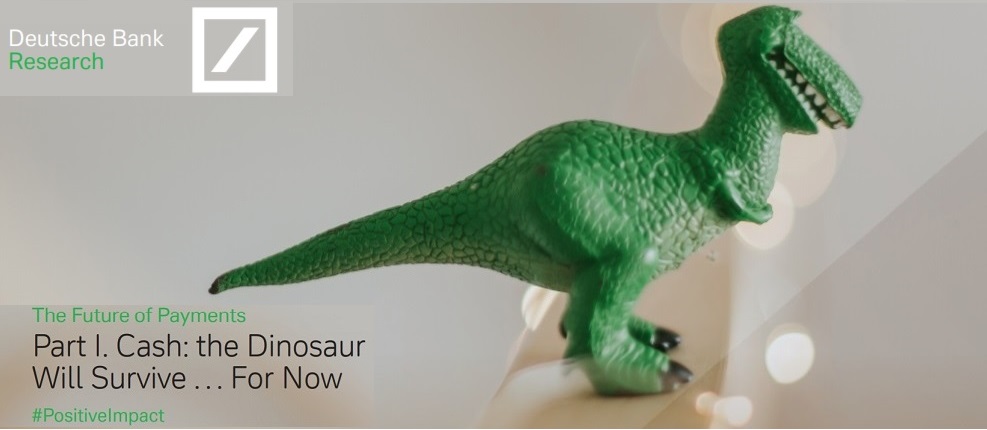
In its latest report, Deutsche Bank argues that „cash is unlikely to disappear anytime soon”. However, a real digital payment revolution has been underway for the past ten years. Cash is losing ground as a payment method. Several countries have recently removed large notes worth $100 or more and implemented policies to replace traditional payment methods with digital solutions. In the midst of these changes, non-sovereign cryptocurrencies pose a threat to political and financial stability.
Far from sounding the death knell of cash, the rise of digital payments will instead lead to the extinction of the plastic card, according to Deutsche Bank research on the future of payments.
The paper takes a contrarian view from the popular assumption that the days of notes and coins are numbered, instead forecasting that cash will be around for decades to come due to a deep-rooted trust in its value during uncertain times.
„When people discuss the future of payments they tend to predict the end of cash,” the study states. „Our view is different. Not only do we think cash will be around for a long time, we see the transition to digital payments as having the potential to do no less than rebalance global economic power.”
Instead, the coming decade will see digital payments grow at light speed, leading to „the extinction of the plastic card”, as mobile payments come to comprise two-fifths of in-store purchases in the US, quadruple the current level.
Similar growth is expected in other developed countries, however, different countries will see different levels of shrinkage in cash and plastic cards. In emerging markets, the effect could arrive even sooner, where many customers are transitioning directly from cash to mobile payments without ever owning a plastic card.
For a glimpse into the future, the analysts look to China, where the value of online payments is equivalent to three-quarters of GDP, almost double the proportion in 2012. Today, just under half of in-store purchases in China are made via a digital wallet, way above the levels in developed markets.
Deutsche Bank is also bullish about the potential for private digital currencies, pointing out that if the growth in blockchain wallet users continues to mirror that of internet users, then by the end of the decade, they will number 200 million, quadruple the current level.
„This will be encouraged by governments, banks, corporates, and payment providers who all stand to benefit from the digitalisation of payments,” the paper notes. „And when countries and companies eventually look back at the way they transitioned to digital payments, it may become very apparent how they achieved their standing in the world economy.”
„To predict the future of cash, the key question is what happens in the world’s two most populous countries—China and India. As the push to remove cash escalates, these governments are encouraging greater use of digital currencies.”, the report said.
In late October, Chinese President Xi Jinping endorsed blockchain as “an important breakthrough for independent innovation of core technologies.” He repeated the PBoC’s intention to have cash replaced by a central bank-issued digital currency.
In India, change is also coming. The government declared in 2016 that 1,000 and 500 rupee notes would no longer be valid despite strong resistance to change and temporary cash shortage. And recently, a government economic panel pitched for the introduction of an official digital currency with the status of legal tender and regulated by the Reserve Bank of India.
Banking 4.0 – „how was the experience for you”
„To be honest I think that Sinaia, your conference, is much better then Davos.”
Many more interesting quotes in the video below: